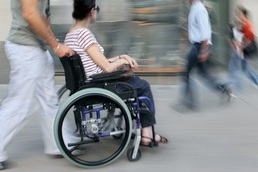Urgent call to House of Lords to end ‘cruel’ 15-minute home care visits
Esther Rantzen is backing a campaign by Leonard Cheshire Disability to end what she calls “cruel” 15-minute home care visits, after an investigation revealed they have risen by 15 per cent over the last five years.

A FoI (Freedom of Information) request by the disability charity found nearly two-thirds of local authorities commission 15-minute visits. This is despite the fact, that it takes most of us 40 minutes to get up, wash and dress and eat breakfast, said the charity.
The report ‘Ending 15-Minute Care’ found that in extreme cases, some local authorities are commissioning three-quarters of all their home care visits in 15 minutes or less.
Esther Rantzen, TV personality and founder of the children’s helpline ChildLine and older people's helpline Silver Line, is backing the charity’s call to end 15-minute care visits.
She said: “I believe it is cruel to treat people like products on a conveyor belt. Providing this kind of care is a personal service and should be accompanied by conversation and at least half an hour of the care worker’s time. It must be deeply distressing for the care worker too when they are unable to treat their client with any dignity or respect because they simply haven’t got the time.”
The short visits do put home care staff in an extremely difficult position according to an 84-year-old woman who receives a 15-minute visit every afternoon. She revealed: “My carers are on pins all the time. They do try their best and they are lovely girls, but what can you do in 15 minutes? You can tell they are looking at the clock all the time, but it’s not their fault. Sometimes they stay with me more than 15 minutes but I know they get into trouble if they do.
“I end up choosing – have I got time to check if they can fill the hot water bottle? Shall I choose between getting my meal prepared or them emptying my commode? Do I get a drink or do I go to the toilet? The visits are company. I get really lonely and I rely on the visits of my carers, but I know they are never stopping long.”
Leonard Cheshire Disability also commissioned a survey by ComRes of 2,025 British adults, which found more than nine in ten (96 per cent) of the public backed the charity’s call for the Government to do more to support disabled people to carry out essential everyday tasks like washing, dressing and getting out of bed in the morning.
Ninety-three per cent of the public agreed that a 15-minute visit was not enough to support a disabled or older person to carry out these everyday tasks.
The charity’s report and opinion poll has been published to coincide with the Report Stage of the Care Bill in the House of Lords on Wednesday 9 October.
Clare Pelham, chief executive of Leonard Cheshire Disability wants members of the House of Lords to back an amendment to make care visits at least thirty minutes long. She said: “Every day, many disabled and older people in the UK receive personal care. It is disgraceful to force disabled people to choose whether to go thirsty or to go to the toilet by providing care visits as short as 15 minutes long.

“Most of us need 40 minutes to get up, get washed and dressed and have breakfast in the morning. None of us would want our family and friends to receive “care” visits as short as 15 minutes. We should demand better from our councillors and remind them that disabled people are real people with real feelings and should be treated as they themselves would wish to be treated – with kindness, with care and with respect.
“It is vital that Parliament backs our call to end the indignity of rushed care which thousands of disabled people face every day. The clock is ticking and this crucial Care Bill vote is peers’ last chance to stop this practice for good.”
The Bishop of Carlisle, James Newcome, is also supporting the campaign. He said: “We have a duty to care for disabled and elderly people. Any of us could be unlucky enough to need help with the parts of life we take for granted: getting out of bed, getting dressed, washing and eating. It is intolerable to think that people are expected to rush through these tasks in as little as 15 minutes. I hope that the government can act and reverse this worrying trend of shorter and shorter care visits.”
The Royal College of Nursing has also backed the campaign. Dr Peter Carter, chief executive and general secretary of the RCN, said: “People with a disability should not have to make choices between one essential care function or another because visits are being scheduled for so little time. Anyone who needs support getting up, washing, dressing and eating should receive these basic rights with adequate time and dignity.”
George McNamara, head of policy and public affairs at Alzheimer’s Society, added his voice to the dissent over 15-minute home care visits.
He said: “Domiciliary care should not be just about doing tasks to people. Home care should be about good quality care, designed to meet a person’s needs, rather than rigid time schedules.
“For the 800,000 people with dementia across the UK, care at home is a lifeline that enables them to remain independent and stay living in the community for longer. Visits lasting fifteen minutes or less cannot possibly provide people with the dignified good quality care and wider support they need and deserve.”
Professor Martin Green, chief executive of English Community Care Association believes “there are no circumstances where fifteen minute visits are appropriate. Fifteen minutes may be enough time to perform a function, but it is certainly not enough time to engage in meaningful interaction which respects the dignity and individuality of the person using the service”.
However The Association of Directors of Adult Social Services has defended the 15-minute visits saying in some cases, they are “fully justified, and fully adequate”.
ADASS President Sandie Keene said: “We must never be complacent. Directors will acknowledge that sometimes time-allocation is insufficient; that sometimes private care providers and local government commissioners underestimate the time needed to carry out certain tasks. And where that happens, adjustments really have to be made.”

“But” she went on: “it is totally wrong to believe that all tasks need more than 15 minutes to carry out. And frankly naïve to believe that simply by abolishing 15-minute slots a magic wand will have been waved, and improvements automatically achieved in our care services. It doesn’t work like that.”
ADASS also claimed that of the councils commissioning 15-minute calls, 88 per cent use these visits to administer medication and 80 per cent for checking up on the individual. Only eight per cent of those councils which commission 15 minute visits use these visits to undertake washing or bathing tasks.
Mrs Keene went on to point to the deteriorating financial circumstances local authorities and adult care have faced during the past three years while – despite ongoing talks about transferring significant sums from the NHS to adult care – overall ASC budgets have been reduced by nearly £800 million in the current financial year.
Cllr Katie Hall, chair of the Local Government Association’s Community Wellbeing Board claims the shortage of funding is being exacerbated by increasing demand and councils need an extra £400 million each year just to maintain services at current levels.
She said: “It is not possible to substantially raise the standard of care on a nationwide basis until more money is put into the system.”
“Significant cuts to council funding mean local authorities are struggling to meet the rising demand for home care visits. Unless local government finance is put on a sustainable footing social care will remain substantially underfunded and services will suffer as a result.
“We agree that 15 minute visits should never be the sole basis for care and councils do not base their provision of support on such an approach. However, in some circumstances such as administering medication they can be appropriate, but only as part of a wider comprehensive care plan involving longer one-to-one visits.”
To vote on this controversial issue go to our poll at www.homecare.co.uk/news/article.cfm/id/12/should-there-be-a-minimum-time-of-30-minutes-for-home-care-visits
Latest News Analysis
 04-Sep-19
Extra £1.5 billion announced for social care in Chancellor's Spending Review
04-Sep-19
Extra £1.5 billion announced for social care in Chancellor's Spending Review
 17-Jul-19
Flexible Working Bill for all jobs gets MPs approval - delighting parents, disabled and carers
17-Jul-19
Flexible Working Bill for all jobs gets MPs approval - delighting parents, disabled and carers
 18-Jun-19
Overnight care workers forced to sleep in offices and told 'bring your own bedding'
18-Jun-19
Overnight care workers forced to sleep in offices and told 'bring your own bedding'
 11-Jun-19
PM candidates on social care: Rory Stewart calls fixing care an 'unfinished revolution'
11-Jun-19
PM candidates on social care: Rory Stewart calls fixing care an 'unfinished revolution'
 05-Mar-19
Amber Rudd announces scrapping of controversial PIP payment review for pensioners
05-Mar-19
Amber Rudd announces scrapping of controversial PIP payment review for pensioners